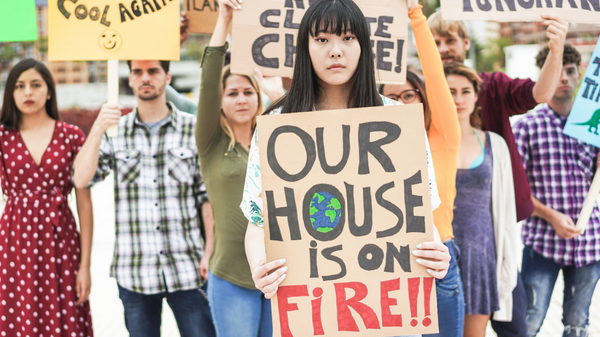A lawsuit filed by a group of 21 youths claiming that U.S. energy policy threatens a constitutional right to a stable climate has been dismissed for lack of standing by the 9th U.S. Circuit Court of Appeals. This is the second time the court rejected the lawsuit.
The case, Juliana v. United States, was filed initially in the U.S. District Court for the District of Oregon in 2015 by Our Children’s Trust, an organization purportedly representing a group of children and young people. Our Children’s Trust has filed a number of other similar suits across the country.
The plaintiffs asserted the existence of a constitutional right to “a stable climate system that can sustain human life,” as quoted in the court document, claiming that by allowing the continued production and use of fossil fuels, the federal government is threatening that right.
The 9th Circuit court previously dismissed the case in 2020, stating the judicial system can only handle lawsuits involving harms that can actually be remedied by the courts, and that it is inappropriate for the courts to attempt to influence or mandate nationwide policy changes.
The plaintiffs requested permission to amend their complaint, which was granted by the lower court, but the problems with the case remained the same. Again, the plaintiffs requested to amend the complaint, but this time it was denied.
Judiciary Cannot “Step into the Shoes” of Executive
In the five-page court ruling, ninth circuit judges Mark J. Bennett, Ryan D. Nelson, and Eric D. Miller explain that in the prior appeal, they had already told the plaintiffs that what they were asking for was unreasonable; that is, declaratory or prospective relief should rest with Congress in the form of passing laws.
“We then clearly explained that Article III courts could not “step into the shoes” of the political branches to provide the relief the Juliana plaintiffs sought,” the judges write. “The Juliana plaintiffs do not seek damages but seek only prospective relief.”
Political Issue
Once again, as with other climate suits put forward by Our Children’s Trust, the trouble they run up against is that they are political complaints and not really legal complaints, says Steve Milloy, founder and publisher of JunkScience.com, and a member of The Heartland Institute’s board of directors.
“The basic legal problem with all the climate lawsuits is that climate change is a political issue and not a legal one,” Milloy said. “As a political issue, it can only be addressed by legislatures; most courts, but not all courts, have understood this.”
Shotgun Approach to Climate Lawfare
Recently, Our Children’s Trust achieved victory in Montana, the first win for the group on this issue. They claimed Montana’s State Energy Policy Act that barred emissions considerations from state energy plans violated the state constitution which, unique among states, guarantees a “clean and healthful environment.”
Our Children’s Trust has active lawsuits in Florida, Hawaii, Montana, Utah, and Virginia, but advertises on their website that they have represented youths from all 50 states in climate-related legal action, “from constitutional climate lawsuits to petitions for rulemaking,” as a form of climate action. With so many cases running through the courts, Milloy says, they are bound to find some that understand the reality of limits on judicial power.
“As these cases and appeals rise through the system, they eventually find themselves in a court that does recognize the limits of courts’ authority in policy matters,” Milloy said. “Here the Ninth Circuit, which is notoriously progressive, showed it understands the legal problem for the second time.”
More recently, Our Children’s Trust suffered another loss when the Central District of California District Court’s dismissed their complaint, in Genesis v. Environmental Protection Agency, which argued the EPA has failed to regulate greenhouse gas emissions enough.
That case had also permitted an amended complaint; however, as with Juliana, the federal judge said the case suffers from lack of standing and the inability of the court to actually address the alleged damages.
Linnea Lueken (llueken@heartland.org) is a research fellow with the Arthur B. Robinson Center on Climate and Environmental Policy at The Heartland Institute.
For more on climate lawsuits, click here.
